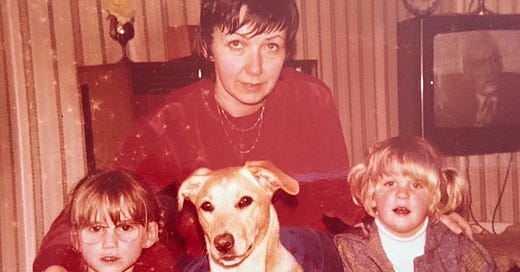Actually, there aren’t many left, mature students, that is. No grants, no childcare, few opportunities now. My father, obviously an ardent follower of Talleyrand’s treatise on education, thought that boys should be educated at public institutions, but girls should only be educated to the level that would enable them to carry out domestic duties. As he said ‘Waste of time, you’ll just get married and have children.’ So I left school with no qualifications except basic typing, shorthand and bookkeeping, and I was rubbish at all of them. I worked in a department store until I got fed up and left home for a summer season in Blackpool, (see previous newsletters) followed by a winter in ‘Swinging London’.
Years later when I had toddlers who were beginning to ask questions, I didn’t want to be the parent who says ‘I don’t know, ask your Father’, and I was finding stay-at-home parenting very difficult. Husband leaving for work at 7.30 am and coming back exhausted at 7pm just in time to put them to bed, the day was a desert with only two very small children to talk to and care for. I managed the mornings quite well, pushing the pram to the shops killed an hour or so. The daily wrestling match of getting my daughters dressed before going to the shops took nearly the same amount of time, the younger one being something of an india-rubber girl and escape artist rolled into one.
Desperate to escape for grown-up conversation and the start of an education, I determined to get some ‘o’ levels. I found a kind friend who looked after the girls and went to college with other unemployed, mature students, some of whom looked as though they wished they were on the bricklayer’s course instead of plodding through Hamlet wondering if the iambic pentameter was a novel plumbing tool.
I took the GCEs with no clear idea of what to do next, but as luck would have it, universities and polytechnics were beginning to admit mature students to some degree courses on the basis of an essay and an interview. I thought I’d apply to Liverpool Polytechnic because they had a Social Studies course and the all-important creche. My GCEs included Sociology and British Politics, so I thought I could manage the modules on offer, which included in addition to the now familiar sociology and politics, economics, geography and history. One of those had to be dropped to be replaced by a compulsory Methods course which most of us came to loathe the closer we got to the end of year exams, but I’m jumping ahead. Get back to where you belong in the story.
I struggled to understand the books I’d been given to read for the essay I was to write, but I staggered through and was invited for interview. When the day dawned, I entered a frowsty study with two bearded, bespectacled lecturers, (male in case you were wondering), sitting behind a large desk. I couldn’t see their lower halves but I guarantee they were wearing cords with socks and jesus sandals. My suspicions were borne out when I saw them in lectures when the term started, as they dressed alike and wore the same outfits all year round. I’ve galloped off again. Rein me in someone or I’ll never get through the first term.
There was a window high on the wall behind my interviewers. It was August and the sun, lower in the sky now, streamed directly into my eyes. Hoping to lighten the atmosphere in the presence of the dour pair, I said ’Ah, an old interrogation trick. Is this the initiative test?’ They looked bewildered, their faces never cracked during the whole interview, nor did they introduce themselves. I didn’t even think that was odd until years later.
One of them made a fuss about me only getting an E in Maths O level. I blurted out that I was more interested in literature and arts, which may not have endeared me to them. He sat up straight and looked at me pityingly,
‘But without maths GCE you won’t be able to do the economics module’.
‘Oh, that’s all right’, I said, ‘that’s the one I want to drop’.
Turned out he was the economics lecturer, and he pointedly ignored me for the three years I was at the Poly.
So I got onto the Social Studies course. My mother was mystified and a little embarrassed that she would have to tell her work colleagues that I wasn’t content to stay at home and look after my babies, but sought the (in her eyes), hedonistic lifestyle of a student. No amount of telling her that it wasn’t easy to get the girls washed, dressed and fed before carting them off to nursery, then attending lectures and studying in the library, would persuade my mother that I wasn’t smoking weed and swilling beer all day in one of the notorious, sticky carpeted hellholes that passed for bars in the Poly in those days.
l’ll save my mother’s passive/aggressive oppression for another time. For now it’s enough to know the first term was hell; trying to establish a routine was almost impossible with unpredictable small children who willfully attracted colds, chickenpox, and any other infections that floated in the air within a 10 mile radius of their button-like noses, rendering them persona non grata at the nursery. Grappling with previously unknown concepts, like Functionalism and Symbolic interactionism was secondary to wiping snotty noses, administering calamine lotion and separating squabbling siblings most weeks, which gave me a practical introduction to Conflict theory, on which I swiftly became an expert.
Thanks for reading. Next time I will tell you all about my adventures in nurseryland and my tangles with the forces of darkness who tried to close it down.
§§§§§§§§§§§§§§§
I’ve read
Tea for Two Amor Towles. The first half of this book is short stories and the second half a novella. The writing is brilliant, ideas and characters conveyed convincingly in a few words. A very satisfying read.
Strange Sally Diamond Liz Nugent. This story grabs your attention from the start, carries you through, which is why the ending is a disappointment. When a character goes on a journey, the essential ingredients they must experience are conflict and change. If either of those are missing, the story doesn’t work properly. That’s what happens here.
I’ve listened to
The Trees Percival Everett. I’ve only just discovered this writer and I love his style. Set in a small town in Mississippi, the story concerns a series of bizarre murders and the detectives who come to investigate them. combining humour with a powerful exposition of racism and ignorance. A great read.
The Kings Curse Phillipa Gregory. A hefty 26 hours listening, bit dour at the beginning but a fascinating trot through the life of Margaret Pole who was born a Plantagenet, a countess in her own right, who was lady-in-waiting to the Queen, guardian to royal children and was ultimately beheaded by one of them.
I’ve watched
Bridgerton - my guilty pleasure. I love the costumes!
Rebus - BBC Iplayer. Competently done but I couldn’t accept Richard Rankin as Rebus. Rebus will always be Ken Stott for me. And the street where he lived was not as in the books, which irritated me.





That’s such a shame to hear that there are few mature students now. My uni course was about 30% mature students and it made a huge difference to have a lovely group of women in their 50s in the classes and lectures offering sage advice to us flighty 18 year olds.
I remember being in my first year of my Arts degree, sitting in Wallace Theatre - about 300 students in the amphitheatre. There was an elderly gentleman, Einstein-white hair, way down at the front of the amphitheatre. I was fascinated by him! I never spoke to him but I have never forgotten him - always very curious and have always loved the idea of being a lifelong learner.
As an adult, I worked in Academic Support at a university that welcomed a significant number of mature students, though by then we didn't call them that. But most had had families and careers and were the first in their families to attempt tertiary education. I loved working with those students.
I love listening to you, Sue. Your mum's response - so so interesting! I loved how you threaded together your study concepts and routines with snotty noses and calamine lotion - I could really see that scene! Love your writing, Sue - precise and engaging with a pleasant touch of humour!